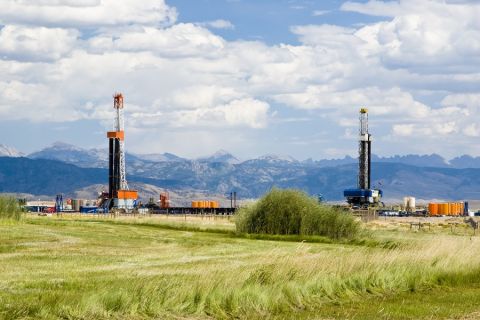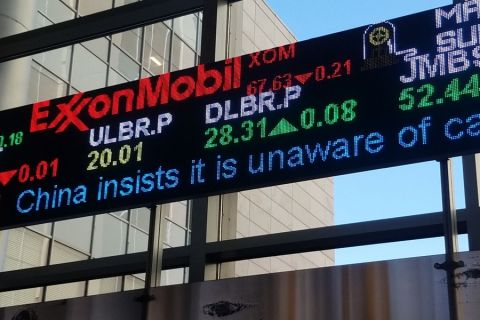They grow concessions big abroad, and in North Africa some U.S. independents are learning what the majors have known for years: North Africa grows oil discoveries big too. With all those prolific Tagi, Silurian and other sands, some companies are drilling no-miss exploration wells-with the help of fresh 3-D seismic results. Consider this: Tunisia is about the size of Louisiana and Algeria is three times the size of Texas. Imagine being given a good chunk of either state 100 years ago and being told to find oil and gas-using today's technology. This is what Irving, Texas-based Pioneer Natural Resources is doing in Tunisia, and Houston-based Anadarko Petroleum Corp. and Burlington Resources are doing in Algeria. Meanwhile, Vanco Energy Co. is working up well plans for offshore Morocco, and Apache Corp. and Ocean Energy are poking holes and bringing up oil and gas in Egypt. Apache announced 10 discoveries in Egypt in 2002, including its fourth in deepwater. "Our experience in Tunisia to date has been very good," says Susan Spratlen, Pioneer vice president, corporate communications. The company's Adam-1 well in its Borj El Khadra Block, which is just inside Tunisia's border with Algeria and Libya, tested 6,000 barrels per day. The well was only the company's second in the small North African country, where Pioneer began doing business less than two years ago. In Algeria, Burlington is preparing to bring its discoveries, which are along the same trend as Pioneer's results, online in mid-2003. Yet, the country has already met its maximum export capacity under OPEC quota restrictions. James Bartlett, Burlington director, corporate communications, says, "The OPEC quota issue will be addressed by Sonatrach, our partner. In the meantime, our development of the MCN Field is on schedule." Anadarko is not holding back on its plans to bring new production online, although it is already not producing as much as it can due to OPEC-quota restrictions, according to Rachel Moore, Anadarko Algeria spokesman. "We continue with our projects. We're committed to Algeria, long-term. The OPEC-quota restrictions haven't stopped us from our plans," she says. The company has capacity of 300,000 barrels per day at its Hassi Berkine South production facility, which serves eight fields in the Sahara Desert. At press time, it was bringing the Ourhoud Field online, reaching capacity of 230,000 barrels per day. "We receive our production levels each month from Sonatrach and that's what we produce to," Moore says. In Tunisia, which is not an OPEC member so there is no cap on output (in fact, the country imports oil to meet internal demand), Anadarko has a 47% interest in the Anaguid (say "ana-geed") Block in the Ghadames (say "guh-dom-us") Basin and expects to begin exploration this year with two wells. Pioneer has 40% of the block. Etap, Tunisia's national oil company, can back in and receive half of each company's interest upon development. Geologically similar to wells Anadarko has drilled just west, in Algeria, the company expects to drill to Tagi in Triassic-age sands. Also in Tunisia, Anadarko has a 50% interest in the Jenein Nord Block, which is south of Anaguid, and an option to explore the Sanrhar concession, which is surrounded by Anaguid. Meanwhile, Pioneer has a position in five blocks in Tunisia-Anaguid; Bazma, Jorf and El Hamra, in which Pioneer has 50% interest and is operator; and Borj El Khadra, of which Agip is operator, with 50% interest, and Pioneer has 40%. Pioneer plans to participate in six to nine wells on its Tunisia blocks in 2003, some exploratory and some to delineate the Adam-1 discovery. The existing Hammouda and Oued Zar fields, thus oil-transportation infrastructure, are about eight miles away from the Adam-1. A well that was drilled on Bazma in 2001 was not commercial, and at least one of the 2003 exploratory wells will be in Jorf. Prospects in each block are in Tagi or Silurian-age Acacus sands. Anadarko produces from Tagi sands in Algeria in the Hassi Berkine and Qoubba (say "ku-buh") fields. Pioneer entered Tunisia in a partnership with Eurogas, a small Canadian company, and added to its position by buying Coho Energy's and Gulf Canada Ltd.'s Tunisian assets in 2002. "We had targeted the Ghadames Basin in North Africa for its rich resource base, and Tunisia offered high-impact prospects with a Western culture that provides a relatively safe venue for our employees. We don't have any complaints," Spratlen says. Chris Cheatwood, Pioneer executive vice president, exploration, says Tunisia is an example of a geology play-not a land play. "We look at where the geology says the best land is. Our acreage is very well situated-you're really at a place where the oil would be expected to accumulate." John Coss, Pioneer manager, new ventures, is particularly excited about opportunities in the Silurian. Elsewhere in North Africa, production is mostly from Tagi sands. There is significant production from Silurian in Libya but less information is available about Libyan wells than others in North Africa. With 6,000-barrel-per-day wells rare finds onshore the U.S., U.S. independents are enjoying better success in North Africa.
Recommended Reading
E&P Earnings Season Proves Up Stronger Efficiencies, Profits
2024-04-04 - The 2024 outlook for E&Ps largely surprises to the upside with conservative budgets and steady volumes.
PropFlow Names David Ward as CEO
2024-05-13 - As CEO, David Ward will lead and build out PropFlow’s operations of eliminating debris from proppant at well sites in the Permian Basin and other plays.
Matador Resources Announces Quarterly Cash Dividend
2024-04-18 - Matador Resources’ dividend is payable on June 7 to shareholders of record by May 17.
JMR Services, A-Plus P&A to Merge Companies
2024-03-05 - The combined organization will operate under JMR Services and aims to become the largest pure-play plug and abandonment company in the nation.
ProPetro to Provide eFrac Services to Exxon’s Permian Operations
2024-04-29 - ProPetro has entered a three-year agreement to provide electric hydraulic fracturing services for Exxon Mobil’s operations in the Permian Basin.





